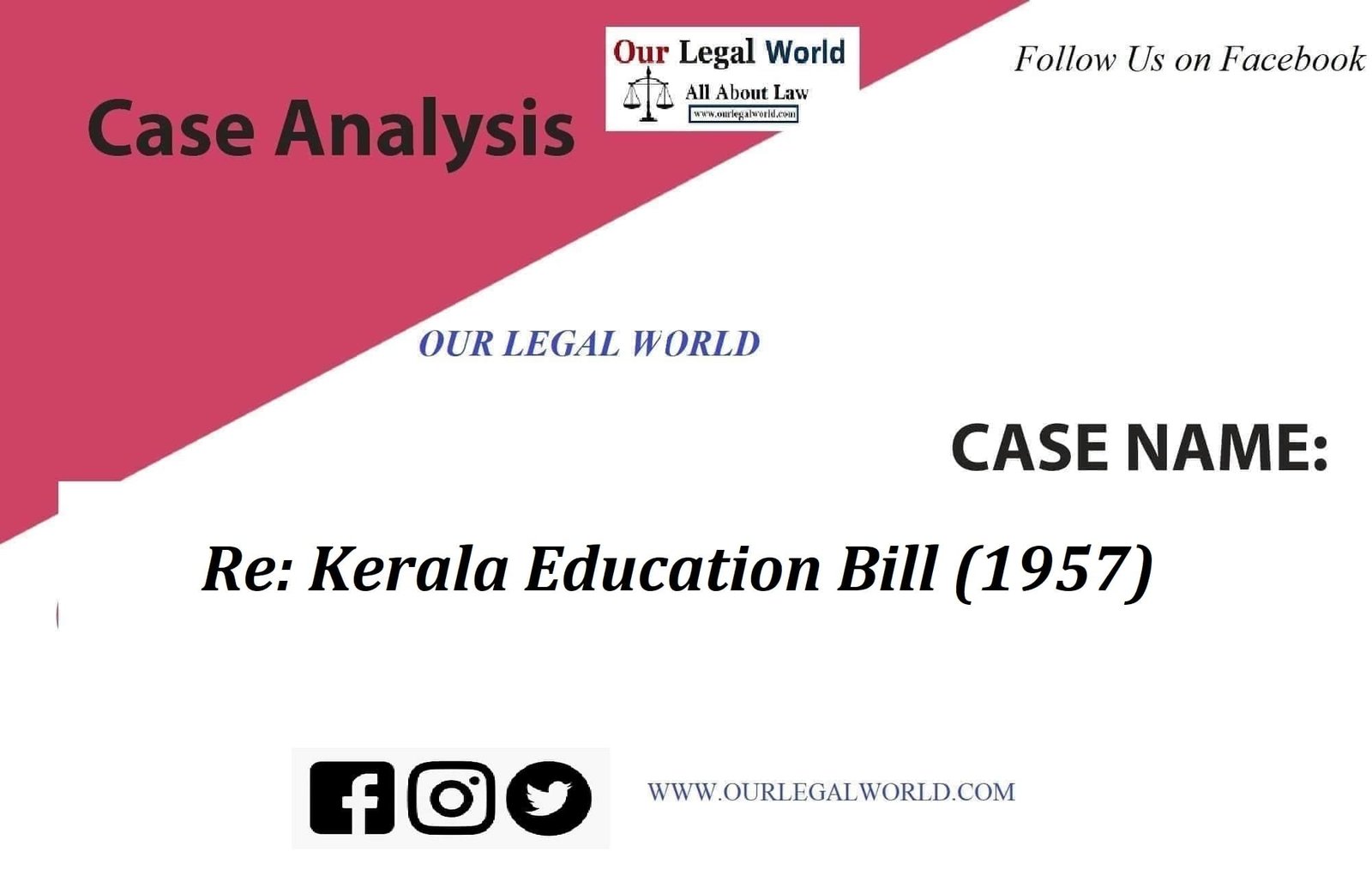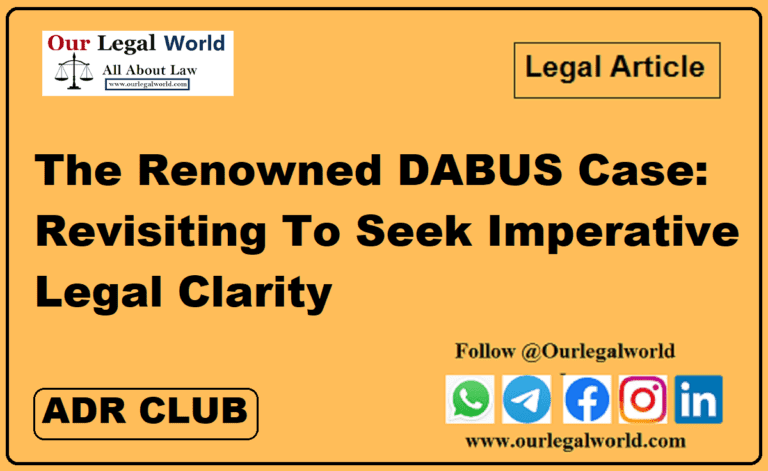Re: Kerala Education Bill (1957) vs. Unknown
Re: Kerala Education Bill (1957) vs. Unknown Citation: 1959 1 SCR 995 Court name: The Supreme Court of India Bench: Das C. J., Bhagwati, B. P. Sinha, Jafer Imam, S. K. Das and J. L. Kapur JJ.
Introduction:
The minority communities are given a substantial importance in India. The Constitution specifically provides them certain fundamental rights under Articles 29 and 30. There were incidents in the past whereby the minorities felt that their rights have been infringed. The Kerala Education Bill that was introduced in 1957 was presupposed to contain some provisions contrary to that of the rights of minorities. To clear the doubts raised in relation to the bill, the President under Article 143 of the Constitution seeks the opinion of the Supreme Court. The Court thought of all the questions placed before it and gave its opinion consequently.
General Background:
Professor Joseph Mundasseri, the education minister for the Communist Party of India (1957), introduced the Education Bill in the Kerala assembly. The Governor of Kerala reserved the bill for consideration of the President. Several doubts were said to have arisen regarding the constitutional validity of the provisions of the bill. Thus, the President used its power under Article 143 of the Constitution and referred the questions to the Supreme Court for its opinion.
Questions placed before the Supreme Court:
- Whether clause 3 (5) and clause 36 of the bill are in violation of Article 14 of the Constitution?
- Whether the clause 8 (3) and clauses 9 to 13 of the bill are in violation of Article 30 (1) of the Constitution?
- Whether clause 15 of the bill violates Article 14 of the Constitution?
- Whether clause 33 of the bill is in violation of Article 226 of the Constitution?
Minorities Educational Institutions:
The learned counsel representing the minorities educational institutions made the following contentions questions respectively:
Question 1
- Clause 3 (5) of the bill provides that the establishment of a new school shall be subject to the provisions, and also the rules made under this bill.
- It was argued that clause 3 (5) attracts all other clauses of the bill. The learned counsel notably mentioned that
-(a) Clause 3 (5) subject to clauses 14 and 15 of the bill offend Article 30 (1) of the Constitution.
-(b) Clause 3 (5) subject to clause 20 offends Article 30 (1) of the Constitution.
The clause makes all the provisions of the bill applicable to new schools that may be established. It offers the Government excessive power which can be used indiscriminately.
- It was further claimed that the clause does not lay down any guiding policy or principle upon which the Government may or may not allow any person or body of a person to establish and maintain an aided school or grant recognition to a school established by any person.
- A further risk of discrimination is alleged to arise as a result, the application of the same provisions of the bill to all the schools which are not similarly situated.
- The learned counsel provided an explanation of how the discrimination may arise – [Article 337 of the Constitution makes a provision for the grant to the Anglo Indians Schools. Articles 29 and 30 of the Constitution protects the educational institutions started by all the minority communities including the Anglo Indians institutions.
There is no such special provision, privilege or protection given to the educational institutions established by the majority community, thus making it different from those established by the minorities. However, the bill purports to place all the educational institutions on the same footing irrespective of the different characteristics. This indiscriminate application of the same provisions of the bill to completely different institutions having different characteristics and being unequal brings about a serious discrimination violating of Article 14 which gives equal protection to all the citizens of the country].
Question 2
- It was submitted on behalf of minorities educational institutions submitted that the proposed bill takes away the management power from the school authorities by imposing the following clauses:
–Clause 8(3) the manager will be in charge of the properties of the school and shall be accountable for the maintenance of the property.
–Clause 9 no court can take cognizance of the offences punishable under clause 6(2) default in furnishing the statement of properties, clause 6(3) furnishing false or incorrect statement of properties, clause 7(4) prohibits selling, mortgaging, transferring, pledging of any property of the school, clause 8(8) not obeying the rules framed under the provisions of the bill.
–Clause 10 any amount, salary or other arrears shall be recovered from the manager. The fees and other dues collected from the students shall be made to the Government.
–Clause 11 the Government will pay salary and may provide for the maintenance grant and grants for the purchase, improvement, repairs of any property of the school.
–Clause 12 the State Register of teachers shall be maintained by the Government.
–Clause 13 managers shall appoint teachers only from the names listed in the State Register.
It was claimed that the above clauses infringe their fundamental right under Article 30 (1) which is absolute and cannot be subjected to any provisions of the bill.
Question 3
- Clause 15 offers power to the Government to acquire any category of school. The learned counsel argued that the said clause gives an unguided power to the Government which might be used indiscriminately. There is no scrutinizing power over the Government thus infringing their right of equality under Article 14 of the Constitution.
Question 4
- Clause 33, provides that notwithstanding anything contained in the Civil Procedure Code, 1908 or any other law for the time being in force, no court shall grant any temporary or make any interim order restraining any proceeding which is being or about to be taken under the provisions of the bill when it becomes an act.
- The learned counsel for the minorities educational institutions expressed that clause 33 of the bill violates Article 226 of the Constitution which confers the power on High Courts to issue writs, orders, and directions to subordinate tribunals, courts and governments officers. It overrides the power given to the High Courts.
State of Kerala:
The learned counsel appearing for the State of Kerala filed an affidavit of statements countering each argument put forth by minority educational Institutions:
Question 1
- According to the learned counsel for the State of Kerala clause 3 (5) of the bill does not attract all the other provisions of the bill. It only attracts clauses 3 (3) and 36 (2) (a) of the bill.
- Clause 3 (3) provides that all the existing schools shall be deemed to have been established in accordance with this act (the Kerala Education Bill) and the rules made there under clause 36 (2) (a).
- Clause 36 (2) (a) provides for the establishment and maintenance of new schools by the Government.
Question 2
While arguing for second question, the learned counsel for the State of Kerala raised two more questions:
- What is minority under Article 30 (1) of the Constitution?
Do The Anglo Indians, Christians and Muslims communities of the State who claim that their fundamental rights under Articles 29 and 30 are infringed because of the provisions of the bill, really constitute, minority in the State? According to the learned counsel for the State of Kerala, people must numerically be a minority in the particular region in which the educational institution in question be or intend to be situated. Only then they are entitled to the fundamental rights under Articles 29(1) and 30(1) of the Constitution. Thus, the Anglo Indians, Christians, Muslims do not constitute the minority and will not be entitled to fundamental rights under Articles 29 (1) and 30 (1).
- What is the scope and ambit of Article 30 (1) of the Constitution?
The State of Kerala provided three conditions there were to be fulfilled to claim the protection and privilege of Article 30 (1):
(i) People claiming rights under this article must constitute a minority community
(ii) One or more members of the minority community should, after the commencement of the Constitution seek to exercise the right to establish an educational institution of his or their choice.
(iii) Such educational institutions must be established for the members of his or her own community.
Question 3
- The power offered to the Government by Clause 15 namely that it can acquire any category of school is subject to restriction. The Government is allowed to use such power only in the interest of public welfare and not arbitrarily.
- Therefore, it cannot be said that the Government has been given unguided power.
Question 4
- In respect to the fourth question it was submitted that clause 33 does not affect Article 226 of the Constitution. It remains unaffected.
- The contention made by the educational institutions that clause 33 violates Article 226 is without foundation.
Supreme Court’s Opinion:
The Supreme Court studied every question in detail and gave its opinion.
Question 1
- While discussing the constitutional validity of clause 3 (5), the court found it is relevant to discuss the validity of other clauses of the bill.
- It was alleged that clause 3 (5) violates Article 14 of the Constitution. The court referred to the previous judgments where Article 14 was the subject and held that it forbids class legislation however allows reasonable classification for the purpose of legislation. It laid down a test for reasonable classification wherein two conditions must be fulfilled:
(i) The classification should be founded on an intelligible differentia.
(ii) There should be a rational relationship between such differentia and the object wanted to be achieved by the statute in question.
The court thus held that clause 3 (5) does not violate Article 14 of the Constitution.
- Passing to the main argument where it was contended that the bill does not lay down guiding policy or principle in the exercise of the wide powers given to the Government by the bill. In respect to this contention, the court stated that the preamble of the bill provides for “better organisation and development of educational institutions.” Each and every clause of the bill needs to be understood and browse within the light of this policy. Thus, wherever a specific clause offers a discretionary power to the Government, such power needs to be exercised in the manner that it sought to achieve the framed policy. It is wrong to mention that no guiding policy has been set down by the bill to scrutinize the power conferred on the Government.
- The court expressed its opinion over clause 36 by stating that the power conferred upon the Government under this clause has to be exercised for the purpose of carrying into effect the provisions of this bill. In similar words, the rules framed must implement the policy and purpose laid down in its preamble and other clauses of the bill.
Question 2
- Two additional questions were raised by the State of Kerala while arguing for the second question. The court made the following observations on the study of those questions.
- The proposed bill applies to the State of Kerala, hence the minority must be determined by regard to the whole population of the State. Thus, Anglo Indians, Christians and Muslims will certainly be minorities in that State.
- On analysing the provisions of Article 30 (1), the Court does not suppose that the protection and privilege of this article applies only to the educational institutions established after the date our Constitution came into operation. If however this hypothesis is considered true, then the educational institutions established by minority communities before the commencement of the Constitution would not be entitled to the benefits of Article 30 (1). This conception clearly violates Article 19 (1) (g) of the Constitution which provides to every citizen of India the right to practice any profession or to carry on any trade, occupation or business. Article 30 (1) broadly covers both pre- Constitution and post- Constitution institutions. The article gives two rights to the minorities namely, to establish and to administer educational institutions of their choice.
- The State of Kerala mentioned three conditions that were to be fulfilled before claiming rights under Article 30 (1). The third condition followed the conclusion that if any single member of another community is admitted into a school established for the members of a specific minority community, then such institution shall cease to be an educational institution established by that specific community. The court was of the opinion that the Article 30 (1) does not contain any such limitation.
- Under Article 30 (1), the religious minorities as well as the linguistic minorities, both have the right to establish educational institutions of their choice. The educational institutions under this article may be classified into three categories:
(i) those which neither seek aid nor recognition from the State Government.
(ii) those which only seek aid
(iii) those which only seek recognition
- 1st category:
According to the learned counsel for the State of Kerala, the institutions which fall within the first category, are by Clause 38 of the bill, outside the scope of the bill. Such institutions would be able to function without any obstruction.
On the other hand, the learned counsel for the educational institutions states that if the educational institutions coming within the first category happen to be located within an area of compulsion, then such institutions will have to be closed down due to lack of students. Because the parents/guardians residing in such areas have to send their children to Government aided and recognized schools by provision made under clause 26. Henceforth it was alleged that clause 26 is in violation of Article 30 (1).
The court supported the argument of the state of Kerala and held that the educational institutions that fall within the first category, not being aided or recognized are by Clause 38 outside the scope of the bill.
- 2nd category:
The second category was again divided into two classes:
(A) institutions which are entitled by Constitution for receiving grants;
(B) institutions which are not entitled by Constitution for receiving grants though demand for grants
- Sub-category A:
The educational institutions established by Anglo Indians come within this sub-category. Such institutions established before 1948 used to receive grants from the Government of that period. Article 337 made two provisions with respect to institutions established by the Anglo Indians. The first proviso provided that such institution shall continue to receive grants from the Government for a period of ten years from the date of commencement of the Constitution. The second proviso imposed a condition to admit at least 40% members of other communities. Article 29 (2) states that no citizen shall be refused admission into any educational institution that receives aid out of state funds on grounds of religion, race, caste language or any of them.
Article 29 (2) and second proviso of Article 337 are the only limitation to the right of the Anglo Indian educational institutions to receive aid.
The learned counsel for the Anglo Indian Institutions submitted that the State is bound to follow the provisions of Article 337. It was criticized that the bill imposes additional conditions on their right to receive grants. Clauses 8 (3), 9, 10, 11, 12 and 13 along with other clauses attracted by clause 3(5) abridges their right to manage their affairs.
They argument advanced by the educational institutions was found reasonable by the court, and held that the aforementioned clauses do offend Articles 337 and 30 (1).
Also Read: Article 21 of the Constitution of India- Right to Life and Personal Liberty
- Sub-category B:
The Constitution of India does not contain any provision for granting aid to educational institutions established by the Anglo Indian as well as for the institutions established by other communities after 1948. Articles 28 (3), 29 (2) and 30 (2) of the Constitution contains provisions for educational institutions receiving aid out of the State funds. However, the proposed bill imposes strict conditions precedent to the grant of aid. For receiving grants from the State funds, the institutions have to submit the conditions set down in clauses 3, 5, 6, 7, 8, 9, 10, 11, 12, 14, 15 and 20.
The learned counsel for the educational institutions opposed these clauses and said that it takes away their fundamental right under Article 30 (1).
On the contrary, the State of Kerala argued that the minority educational institutions must submit to the conditions just like other educational institutions do.
In Court’s opinion, clauses 8 (3), 9, 10, 11, 12 and 13 are regulatory in nature and do not offend Article 30 (1). However, clause 3 (5) subject to clauses 14 and 15 do offend Article 30 (1) of the Constitution.
- 3rd Category:
The State of Kerala maintains that the minority communities may exercise their fundamental rights under Article 30 (1) without any obstruction. However, when they seek to have recognition from the State, they must submit to the conditions precedent to recognition.
Conclusion:
The Supreme Court answered each question in negative. It was the second time when the President made reference to the Supreme Court under Article 143 of the Constitution. Such power was used for a first time in, “Re The Delhi Laws Act (1951 AIR 332).” The court, while rendering the opinion over the questions placed before it, gave a wide interpretation to Articles 29 and 30.
References:
- Kerala Education Act 1958 (Act 6 of 1959) – Wikipedia
- https://indiankanoon.org › doc In Re: The Kerala Education Bill vs Unknown on 22 May, 1958
- https://www.latestlaws.com › march Re: The Kerala Education Bill, 1957
- https://mhrd.gov.in › files › L…PDF the kerala education act – 1958 – MHRD







